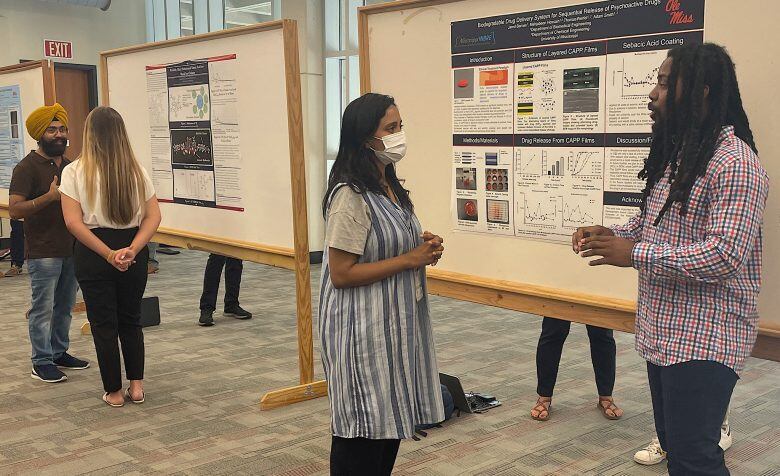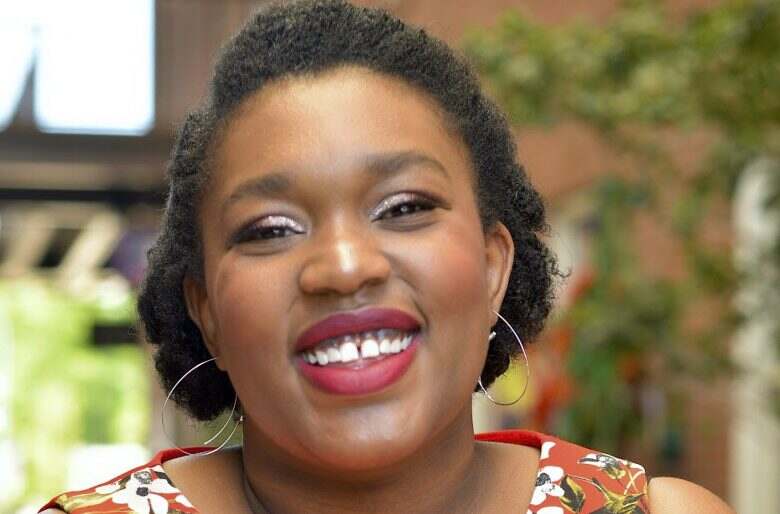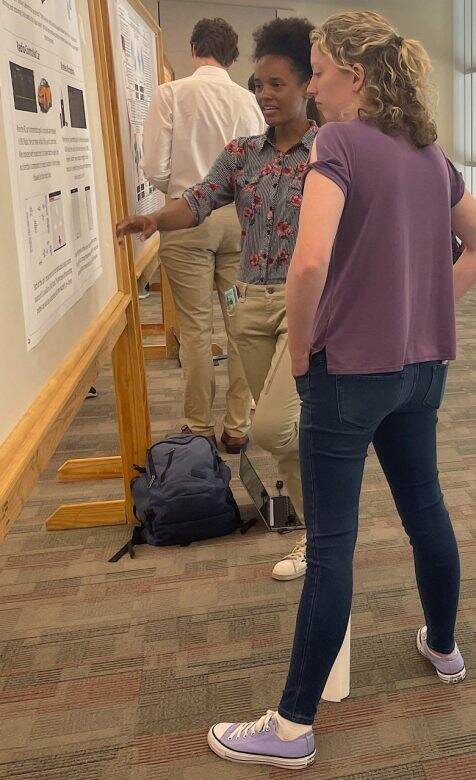Undergraduate program opens doors to new creative scholarship
September 15, 2021 By Shea Stewart

Jared Barnes (right), a senior biology major from Grenada, talks about his biodegradable drug delivery system research during a poster presentation for the UM Summer Undergraduate Research Group Grant program. Photo by Shea Stewart/UM Office of Research and Sponsored Programs
Sydni Davis found herself in rewarding new territory this summer.
The University of Mississippi sophomore from Tupelo spent the summer conducting interviews with Black women, gaining valuable experience in ethnographic methods as part of a summer research project.
“I am proud of myself for collecting my data and conducting interviews,” said Davis, an African American studies major. “This experience has given me the confidence to pursue more research. Diving into this headfirst, I was not sure how I would fare, but I proved to myself how capable I am.”
Davis was among 15 UM undergraduate students who investigated new research areas or creative scholarship, or furthered their existing knowledge, as part of the university’s Summer Undergraduate Research Group Grant program, which is funded by the Office of the Provost and administered by the Office of Research and Sponsored Programs.
The 8-10-week fellowship program allows students to conduct individual research and creative scholarship projects through the summer with a faculty member as a mentor.
The program also prepares faculty collaborators to submit competitive external funding proposals for undergraduate research activities by designing and conducting a pilot summer program in a thematic area of interest to the faculty team.
Jared Barnes, a senior biology major from Grenada, was a member of the Ole Miss Nanoengineering Summer REU Program, which is designed for undergraduates to enhance their research activity within the School of Engineering and assist collaborations between early career and established faculty. Hosted by the Department of Biomedical Engineering, students were able to choose from research projects in one of three emphases: nanobiotechnology, computational nanoengineering and sustainable nanoengineering.
Barnes’ research topic was investigating a biodegradable drug delivery system for the sequential release of psychoactive drugs.
“I wanted to pursue this topic because I have always had a strong interest in the psychology field,” he said. “On top of that, I have the intention of becoming a physician one day and want to help tackle many of the health disparities present today.
“This topic deals with that issue by providing a cheaper, more convenient option for patients who require the repeated drug administration treatment.”
His project involved working with different drug delivery films, including applying parafilm and wax coating to polymeric films, to further examine durable film coatings and how they can be managed to better release drug doses.
“This was my first research experience of actually taking data on my own and feeling as if I played a vital role within the research throughout the entire summer,” said Barnes, who plans to attend the UM Medical Center after earning his bachelor’s degree. “With that being said, I have truly grown a passion and love for research with now an open mind to the possibility of doing more in the future.”

Sydni Davis, a sophomore African American studies student, presented her oral history project, ‘Soul Food and Soul Searching,’ during a poster presentation for the UM Summer Undergraduate Research Group Grant program. Submitted photo
Davis’ oral history project was conducted under the guidance of researchers in the Department of Sociology and Anthropology and the Center for the Study of Southern Culture.
She was one of three students involved in the summer research experience that used interdisciplinary approaches to the study of race, power and place-identity.
The program benefited students by honing their methodological skills and better preparing them for writing and presenting their findings.
The students, who also were exposed to the differences, debates and key overlaps in methodologies, were encouraged to and received instruction on how to prepare reports for submission to the peer-reviewed journal Study the South or Mississippi Stories.
Davis’s summer research project resulted in “Soul Food and Soul Searching,” an exploration of how the relationship between food in Black culture and racialized beauty standards can lead to disordered eating symptoms in Black women.
“I chose this project because I have seen the effects of eating disorder symptoms and Eurocentric beauty standards in my own body and life,” she said. “Black women are often the ‘other,’ meaning that we are easily ostracized especially in the arenas of beauty and health.
“I have felt the effects of beauty standards I will never quite live up to because they were not meant for me in the first place. My hope for this project is to give Black women a voice, so we can speak for ourselves.”
Davis plans to pursue master’s and doctoral degrees in museum studies in hopes of becoming a museum director and inspiring young Black women and bringing more inclusivity to the museum world.
For Santana Amaker’s summer research project, the senior computer science and international studies major from Biloxi studied denial-of-service attacks using a device capable of transmitting or receiving radio signals that is designed to test and develop modern and next-generation radio technologies.
She was one of five students collaborating with mentors in the Department of Computer and Information Science on projects involving cybersecurity research methods that exposed the students to various security risks and mitigation strategies.

Santana Amaker (left), a senior computer science and international studies major, discusses her summer research project about denial-of-service attacks during a poster presentation for the UM Summer Undergraduate Research Group Grant program. Photo by Shea Stewart/UM Office of Research and Sponsored Programs
Through the summer research experience, Amaker created a program that allows for denial-of-service attacks.
“I believe that the experience helped me become a better researcher by allowing me to become more independent in my learning,” said Amaker, whose interests include studying vulnerabilities in wireless devices.
“With this program, there was a lot of responsibility placed on me to independently research and turn to my professor for help when I faced a difficult problem, rather than at every step. I think this is much closer to what I will experience working in the tech industry, which is why I see this program as an invaluable opportunity.”
Four students were involved in the Department of Chemical Engineering‘s “Snazzy Surfaces for Students” program, which offered talented undergraduate students an opportunity to join the multidisciplinary surfaces and interfaces team to learn key research skills.
The students learned about surfaces, interfaces and material development, and used the university’s Quartz Crystal Microbalance with Dissipation, a highly sensitive balance that can detect changes in mass at the molecular level using a quartz crystal, which registers minuscule deviations in frequencies and loss of energy.
The program taught students research know-how, creativity and innovative skills, which are fully transferable to future industry or research careers in STEM.
One of those students in the program was Jack Flanders, a junior psychology and biochemistry major from Munford, Tennessee, whose research topic explored protein adsorption on ionic liquid-capped nanoparticles.
“These nanoparticles have shown a wide variety of potential medical applications; however, in order to be effectively used, we need a better idea of exactly how the nanoparticles interact with proteins in the body,” said Flanders, who plans on attending medical school, specializing in psychiatry. “I was able to start my own research project, which will set the groundwork towards my thesis.
“This program taught me a lot about how rewarding research can be. Long hours and extra work are all worth it when you have good data to show for it.”
More than 50 undergraduate students have participated in the program, which began in 2018 and offers participants valuable knowledge and skills while expanding and enhancing the university’s undergraduate research and creative achievement efforts.
The students’ output results in or contributes to a finished product that is significant, such as a presentation of the creative work or a publishable paper.
